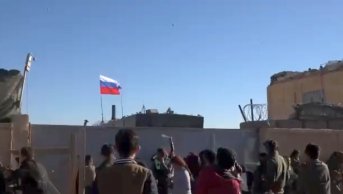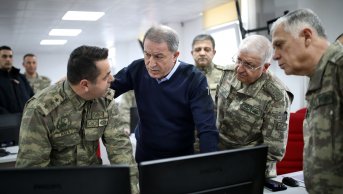Kurds: Winners of the Civil Wars in Iraq and Syria

There were claims that 21st century would be the century of Kurds. Although it is early to confirm these claims, the year 2015 has witnessed historical developments for Iraqi and Syrian Kurds. The rhetoric and grounds for independence of the Iraqi Kurds grows stronger, while their ties with the central government are weakening. The Syrian Kurds, who are considered to be the weakest link among the Kurds, have actually established their autonomous administration, while almost attaining political status.
Two developments linked to each other have made all these possible. The first is the civil war in Syria that weakened the central authority after the popular uprising, which started in March 2011. This development has strengthened the decentralized factions in the country. Kurds and PYD were the most prepared factions in this period. The second development is the emergence of the Islamic State of Iraq and Sham (ISIS) in the protracted Syrian civil war. ISIS was able to capture vast territories and natural resources in Iraq and Syria. Kurd has benefited from the growing power of ISIS in several ways. First, ISIS has worsened the conditions that led to the weakening of central authority in Iraq and Syria, thus paving the way for local powers. Second, fighting against ISIS has become the main instrument for acquiring international prestige, legitimacy and assistance. Therefore, Syrian Kurds as the most suitable candidate for alliance with the West have grown in power. In this context, Western military support for PKK, PYD and Iraqi Kurdish Regional Government and debates about removing PKK from the terrorists list became possible. Another effect in Iraq was the disappearance of the geographical link between Arbil and Baghdad. Therefore, the legitimate grounds and required conditions have emerged for the Iraqi Kurds’ independence rhetoric. Besides, the problem of contested areas between Arbil and Baghdad has been automatically resolved in Kurds’ advantage, albeit momentarily. The Pashmargha moved in to fill the power gap in contested areas, primarily Kirkuk, as the Iraqi army had withdrawn in the face of the ISIS threat.
Cooperation and Competition among the Kurdish Actors after ISIS
The most important advantage that ISIS has created for Kurds is the alliance and cooperation among the competing Kurdish political and military factions against a common threat. The struggle for retaking the territories that Iraqi Kurds lost to ISIS in Mosul, Kirkuk, Dİyala and Arbil was supported primarily by PKK, YPG and Iranian Kurdish forces. During the operations to retake Sinjar, which is a link between Iraqi and Syrian Kurds, the KDP Pashmargha joined forces with YPG. PKK also supported the PUK forces fighting against ISIS around Kirkuk, Arbil and Diyala. After opposing the incursion of the forces loyal to Barzani to Syrian Kurdish regions, PYD accepted the KDP pashmargha into Kobane through Turkey after ISIS besieged the city. It was surprising that KDP and PKK, the most quarrelsome two among Kurdish actors, fought together in Sinjar, Gwer and Mahmur. Even there were photos of the KRG President MassoudBarzani shaking hands with the PKK commanders during his visit to the fighting areas in Mahmur.
The unity among the Kurdish actors was crucial in the partial success against ISIS in Iraq and Syria. Yet the more important factor was the support provided by the anti-ISIS coalition led by the US. By this means, it was possible to eliminate the immediate threat of ISIS. The weakening, though not the elimination, of the common threat demonstrated the vulnerability of the unity among Kurds. It is also seen that new areas of competition have emerged for the factions.
According to the PKK’s Political Position Document that was declared in the Congress of 2013, one of the priorities was “being an influential actor in Iraq”. PKK acquired opportunities for this objective in the joint struggle against the ISIS. After its “sacrifices” in Kirkuk, Mosul and Diyala, PKK showed that it is unwilling to withdraw from these areas. After the waning of the common threat, the questions about who will control the areas that were “regained together” have emerged. The rhetoric of PKK leaders calling for democratic and federal administration in Iraqi Kurdish regions shows that PKK wants its own control zones in Iraq. By this means, PKK not only reinforced its power in Syria, but also started to challenge KDP in Iraq. An important factor that pushed PKK against KDP is Iran. Iran cooperates with PYD/PKK in Syria and seeks to balance the rising influence of KDP in Iraq through PKK-PUK alliance. It supports the establishment of cantons in the Iraqi Kurdish regions that is controlled by different actors.
Considering the increasing intra-Kurdish competition, it is obvious that the Kurdish belt south of Turkey’s southern borders is controlled by different actors with different political agendas and regional alliances.
Kurdish Belt and Turkey
Despite its inner conflicts and confrontation risks, the bigger picture suggests that a Kurdish region has appeared ranging from the Iranian border to the Mediterranean. In geographical terms, all that stands between the integrated Kurdish region and the Mediterranean is the ISIS-controlled zone west of Kobane, Syrian opposition’s zone west of Afrin and Bayir-Bujak Turkmen zone near Latakia. Without Turkey’s military intervention, it is highly likely that Kurds will capture the areas between Afrin and Kobane with the US air support.
In the perspective of Turkey, there are two different approaches regarding Kurds in Iraq and Syria. Turkey sees an autonomous Kurdish region in Iraq as an opportunity, as long as it does not declare independence. The rising Iranian influence over Baghdad, deepening sectarian rifts and energy cooperation with the KRG are the main reasons of Turkish approach toward Iraqi Kurds. Yet for Syrian Kurds, Turkey does not have any perception for an opportunity. Therefore it has two problems regarding the Kurdish belt in Syria. Firstly, the mentioned zone is controlled by PYD/PKK, an actor which Turkey deeply distrusts and considers a security threat. In addition to the worries related to border security, there are also widespread concerns that such a situation will weaken Turkey’s hand in its primary problem, the Kurdish solution process. A second and similarly important issue is that if the Kurdish belt expands to cover all the middle territories, Turkey’s geographical link with the Arab world will be severed. Under such circumstances, Turkey will have to carry on its opening to Middle East through PKK/PYD. Therefore, a potential Turkish military intervention to the north of Syria needs to be considered not only as a response for a PKK controlled Kurdish zone, but also in the context of Prime Minister Ahmet Davutoğlu’s statement, “We will never allow Turkey’s link to Aleppo to be severed”.
The developments in the north of Syria are not only a foreign policy issue for Turkey, but also are very closely related to its domestic security and territorial and political integrity. In this sense these developments are important for the solution process in Turkey as well. The priority of PKK/PYD is a political statute in the north of Syria. The war in Syria provides PKK with ample opportunities. While it acquires international legitimacy with the fight against ISIS, it acts as the pioneer of Kurdish ethnic nationalism in the region. It has gained confidence, military strength, permanent regional control and the position of a center of attraction for local Kurds. As it grows and feels stronger, it will no longer need to enter into political negotiations. In other words, it will consent to a peace only under its own maximalist terms.
The original of this article was published on Aljazeera Turk website.












